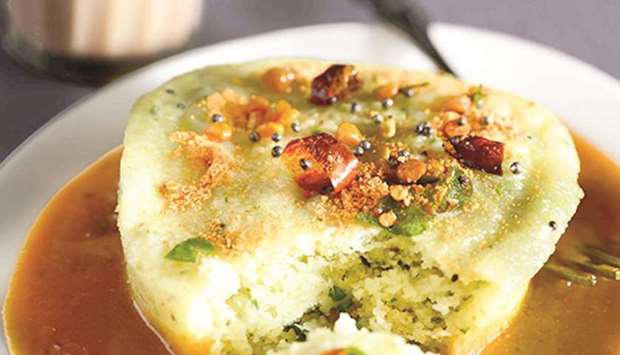According to a celebrated food historian, the idli originated in Indonesia which has a long history and tradition of making steamed and fermented rice dishes. He cites that India did not have a steaming vessel in 7th century. He also states that an Indonesian dish called Kedli, a similar fluffy steamed cake was the precursor of the Indian Idli. Another similar dish in Indonesia is Bura, a rectangular rice cake cooked on coconut milk that is served with spicy coconut powder. Also with a proven historical links with the rulers and traders of South East Asia and South India, the theory of origin of this popular food is plausible.
The flavourful stew that accompanies the steamed rice cake is sambar, a lentil stew tempered with mustard seeds, red chili, curry leaves and other aromatic spices. The stew is then finished with tamarind and jaggery to make it a perfect balance of sweet and sour taste. As for this delicious medley of lentils and vegetable the story goes that the original recipe for this dish can actually be traced to Maratha ruler Shivaji’s son Sambhaji. He was very fond of amti, a thin spicy dal made with a handful of the sour kokum. Once the kokum imported from the coast did not reach the king’s kitchen. Sambhaji who was fond of cooking also decided to experiment by using tamarind pulp instead. The dish he made was served and was later on declared an outstanding preparation. Sambhaji loved his own recipe and gradually the dish became to be referred as sambar.
For the kids and infants too idli is a perfect food to introduce them to solid foods. It is an easy dish to carry while on the go and can be consumed while you are travelling. Idlis are a great source of carbohydrates and proteins and the fermentation process increases the bio availability of proteins and enhances the vitamin B content of the food. As it is steamed the fat content is low and makes idli easily digestible and easy on the stomach.
Few days back I was preparing plain idli and a thought came to my mind to prepare some other variants too. That is when I prepared another popular variety of the idli – the Kanchipuram Idli. This variety is a slight variation from the regular recipe. The cumin seeds and pepper give a distinct flavour to this idly. The best accompaniment for kanchipuram idli is kara chutney which is tempered onion and tomato spicy chutney. Try out this delicious recipe and I am sure you’ll be delighted and will make this more regularly.
Kanchipuram Idli
Ingredients
Urad Dal 1 cup
Raw rice 1 cup
Par boiled rice 1 cup
Salt to taste
Cumin seeds 1 tsp
Fenugreek seeds 1 tsp
Mustard seeds 1 tsp (optional)
Pepper 1 tsp
Ghee 1 tsp
Oil 2 tsp
Cashew nut 10-12 nos
Ginger powder 1 tsp
Method
Soak the rice and urad dal separately in water for at least 2 hours.
Add fenugreek seeds along with urad dal, rinse and drain the water.
Grind the rice and urad dal in grinder to a thick blender, the batter should be rough and not smooth.
Add salt and keep the ground idly flour separately for 1/2 hours for the batter to undergo fermentation.
Next day you’ll notice the batter has risen to almost double and fermented and would have become fluffy.
Heat oil in a heavy bottom pan and add mustard seeds and when they sputter add chana dal and fry till the dal turns golden colour.
Add curry leaves, cumin powder and fry for 10 seconds.
Add this tempering to the batter and stir the batter to combine well.
Now te batter is ready, grease the idli steamer mold with oil and place roasted cashew in each mold.
Scoop the idli batter in the mould and steam cook it in pressure cooker for about 10 minutes.
Allow the steam to release and allow it to cool down and then using a spoon, scoop to the prepared idli.
You can also cook these idli in a cake tin or a flat bowl.
Grease the cake tin and pour the idli batter and steam cook it for 12-14 minutes.
Once cooked allow to cool down a bit and demold and cut into desired triangle shape and serve hot with kara chutney or malgapudi powder.
Note: if you are team cooking the idli in the cake tin, it will take longer to cook as compared to individual idli.
* Chef Tarun Kapoor, Culinary Mastermind, USA. He may be contacted at [email protected]

